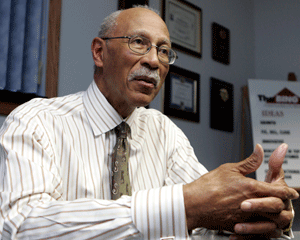DETROIT — Detroit businessman Dave Bing and incumbent Mayor Ken Cockrel Jr. came out on top in Tuesday’s special mayoral primary election. The two will face off in a May 5 runoff.

|
|
Detroit businessman Dave Bing Reuters |
Bing garnered 29 percent of the vote. Cockrel received 27 percent. Former Deputy Mayor Freman Hendrix came in third with 23 percent and Wayne County Sheriff Warren Evans got 10 percent.
Money and name recognition proved key to propelling Cockrel and Bing past 13 other candidates.
Bing, a former star basketball player with the Detroit Pistons, used high-level corporate connections to raise almost $900,000, with which he bought considerable radio and TV time.

|
|
Interim Mayor Ken Cockrel Jr. PHOTO: Khalil AlHajal/TAAN |
Voter turnout was light, at just under 15 percent, as Detroiters cast ballots in the first of four mayoral elections this year.
“We would have liked it to have been more,” said precinct chairwoman Jacqueline Wallingford at precinct 1640 in the Jesse Chase Branch Library on Seven Mile Road near the Southfield Freeway.
She said lines of voters stretched outside the building and around the corner during the November presidential election.
“How could you live in Detroit and not know that there’s a primary?” she asked.
“It’s sad, because it’s so important,” said poll worker Stephanie Williams.
Williams, a poll worker for the last ten years, said she did notice a few extra younger voters this time around.
Twenty-year-old voter Alexander Coleman, a Wayne County Community College student, said he voted for Cockrel.
“He’s already shown improvement. He came in and he knew what he wanted to do,” Coleman said.
He said he’s seen more police walking the streets rather than patroling in their cars since Cockrel took the reigns in September.
Coleman said it frustrates him that more people don’t vote in smaller elections like mayoral primaries.
“They actually have more purpose than the bigger elections,” he said. “When you’re always saying ‘my city is bad,’ but you don’t vote… you’re not trying to make no change for it.”
A second 2009 mayoral primary is to be held Aug. 4, with the runoff on Nov. 3. The winner is to serve a four-year term.
The four elections this year will cost Detroit taxpayers $6 million.
Of six proposals on the ballot, all but Proposal M were passed.
Proposal L: Pays for improving street lighting. Cost: $22 million ($7.86 per year on a home with a taxable value of $100,000).
Proposal M: Would have paid for the acquisition, construction, renovation or rehabilitation of city government facilities. Cost: $35 million ($12.51 per year on a home with a taxable value of $100,000).
Proposal N: Pays for various neighborhood redevelopment and housing rehabilitation projects, as well as economic development projects. Cost: $25 million ($8.93 per year on a home with a taxable value of $100,000).
Proposal C: Pays for the acquisition, construction, renovation or rehabilitation of city museums, libraries, recreation and other cultural institutions. Cost: $97 million ($34.66 per year on a home with a taxable value of $100,000).
Proposal S: Pays for the acquisition, construction, renovation or rehabilitation of public safety projects related to police, fire and emergency medical services. Cost: $72 million ($25.73 per year on a home with a taxable value of $100,000).
Proposal T: Pays for the acquisition, construction, renovation or rehabilitation of transportation facilities. Cost: $12 million ($4.29 per year on a home with a taxable value of $100,000).






Leave a Reply